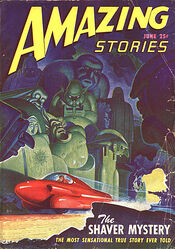October 8
Better Than News
The Pope's Gladiator is an epic historical supernatural horror film directed by Ridley Scott and Julius Avery, and starring Russell Crowe.
Pulp Shining is a black comedy supernatural crime film written and directed by Quentin Tarantino and Stanley Kubrick about hitmen Vincent Vega (John Travolta) and Jules Winnfield (Samuel L. Jackson), who become winter caretakers at the isolated Overlook Hotel.
Alien Eyewitness is a neo-noir science fiction horror film directed by Peter Yates and Ridley Scott, starring Sigourney Weaver and William Hurt.
Alps! is one of the so-called "lost" Beatles albums.
Marooned 2: Blind Date is an American science fiction romantic thriller film about the perils of dating in low Earth orbit.
Invasion of the Dobby Snatchers is a science fiction fantasy invasion horror film starring Donald Sutherland, Leonard Nimoy, and Veronica Cartwright.
Voldemort is a 1958 fantasy psychological thriller film directed by Alfred Hitchcock and starring James Stewart and Kim Novak.
Xena: X-Files Princess is an American science fiction television series about Xena (Lucy Lawless), an infamous warrior on a quest to seek redemption for her past sins against the innocent by using her formidable fighting skills to now help those who encounter paranormal phenomena.
Beyond Plausible
My Three Sons: The Next Generation is a television series about three crime-fighting brothers from the future (ZZ Top) who must go back to the past to prevent their father (Fred MacMurray) from inventing the time machine.
In Other Words
Kindergarten Terminator is an American action comedy science fiction thriller film starring Arnold Schwarzenegger.
Fetal Recall is a science fiction action drama film based on the novel of the same name by Philip K. Dick and Frank Herbert.
Are You Sure

• ... that writer and artist Richard Sharpe Shaver (8 October 1907 – 5 November 1975) achieved notoriety with stories in which he claimed that he had personal experience with a sinister, ancient civilization that harbors fantastic technology in caverns under the earth?
• ... that mathematician Joseph Wedderburn (2 February 1882 – 9 October 1948) showed that every semisimple algebra finite-dimensional can be constructed as a direct sum of simple algebras, and that every simple algebra is isomorphic to a matrix algebra for some division ring; and that the Artin–Wedderburn theorem generalizes this result with the ascending chain condition?
• ... that SN 1604, also known as Kepler's Supernova, was a Type Ia supernova that occurred in the Milky Way, in the constellation Ophiuchus; that it appeared in 1604; and that prior to the adoption of the current naming system for supernovae, it was named for Johannes Kepler, the German astronomer who described it in De Stella Nova ("The New Star")?
• ... that theoretical physicist Tullio Regge (11 July 1931 – 23 October 2014) introduced Regge calculus, a simplicial formulation of general relativity; and that Regge calculus was the first discrete gauge theory suitable for numerical simulation, and an early relative of lattice gauge theory?
Selected Anniversaries
1604: The supernova now called "Kepler's nova" was first sighted in the constellation Ophiuchus, the Serpent Bearer. Johannes Kepler observed it from the time of its appearance as an apparently new star. It encouraged him to write The New Star in 1606.
1860: Telegraph line between Los Angeles and San Francisco opens.
1907: Author and illustrator Richard Sharpe Shaver born. He will write stories in which he claimed that he has had personal experience of a sinister, ancient civilization that harbors fantastic technology in caverns under the earth.
1924: Mathematician and statistician John Nelder born. He will contribute to experimental design, analysis of variance, computational statistics, and statistical theory. He will also be responsible, with Max Nicholson and James Ferguson-Lees, for debunking the Hastings Rarities.
1942: Physicist, mathematician, and engineer Sergey Chaplygin dies. He is known for mathematical formulas such as Chaplygin's equation, and for a hypothetical substance in cosmology called Chaplygin gas, named after him.
1985: Mathematician, cryptographer, and author Gordon Welchman dies. During the Second World War, he developed traffic analysis techniques for breaking German codes.
Topic of the Day
Eagles
The Eagle Has Tweeted is a 1975 novel by Tannery Strophe about a fictional German plot to impersonate Winston Churchill on Twitter near the end of the Second World War.


















